| Srl | Item |
| 1 |
ID:
005481
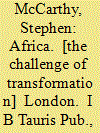

|
|
|
|
|
| Publication |
London, I B Tauris Pub., 1994.
|
| Description |
xv, 257p.;figures
|
| Standard Number |
185043820X
|
|
|
|
|
|
|
|
|
|
|
|
Copies: C:1/I:0,R:0,Q:0
Circulation
| Accession# | Call# | Current Location | Status | Policy | Location |
| 036704 | 330.96/MCC 036704 | Main | On Shelf | General | |
|
|
|
|
| 2 |
ID:
085630
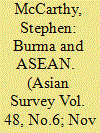

|
|
|
|
|
| Summary/Abstract |
Burma's relations with ASEAN have changed signifi cantly since 1997. This article examines how Burma-ASEAN relations have been influenced by intense international pressure and ASEAN's desire to maintain regional credibility. As ASEAN continues to redefine its position with Burma, the generals' relations elsewhere may continue to define it for them.
|
|
|
|
|
|
|
|
|
|
|
|
|
|
|
|
| 3 |
ID:
092636
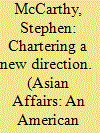

|
|
|
| 4 |
ID:
142229
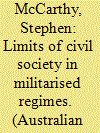

|
|
|
|
|
| Summary/Abstract |
The nature of civil society is transformed by a strong military presence, which occurs in the Asia-Pacific region. While modern civil society survives under military rule through co-optation, veiled resistance or geography, traditional organisations may continue to threaten the state's dominance of political society. This article examines the nature of civil society in two countries in the Asia-Pacific that have recently emerged from direct military rule—Burma and Fiji. It considers the independence of civil society under military rule, how militaries take steps to safeguard their roles in political society, and how democratic postures change during transitions away from military rule. Understanding how militaries preserve their influence provides a better perspective of authoritarian resilience in the region and the limits to democratic reforms.
|
|
|
|
|
|
|
|
|
|
|
|
|
|
|
|
| 5 |
ID:
145445
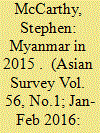

|
|
|
|
|
| Summary/Abstract |
The general election dominated events in Myanmar, while the government pushed for a Nationwide Ceasefire Agreement before the polls. Attention was drawn to student protests and the plight of the Rohingya boat people. Major flooding caused havoc throughout the country and moderated expectations for economic growth. Throughout the year, the government and opposition parties dealt with internal management issues, voter and candidate lists, and partisan electoral politics.
|
|
|
|
|
|
|
|
|
|
|
|
|
|
|
|
| 6 |
ID:
152253
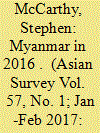

|
|
|
|
|
| Summary/Abstract |
The new government in Myanmar in 2016 faced many of its predecessor’s challenges; however, some progress was made in policy reversals and legislative reform. Although the government hosted a major ethnic peace conference, violence erupted again in Rakhine State as community tensions transformed into armed conflict. The country experienced more flooding, an earthquake, and a slowing economy locked into falling commodity prices.
|
|
|
|
|
|
|
|
|
|
|
|
|
|
|
|
| 7 |
ID:
135086
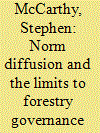

|
|
|
|
|
| Summary/Abstract |
The return of the World Bank Group (WBG) to Burma after some 25 years’ absence, along with other international financial organizations, follows a series of extraordinary political reforms that have taken place in the country since 2010. Burma has made a transition from 50 years of authoritarian rule to what its leaders call ‘disciplined democracy’. This paper examines the likely consequences of the Bank's return for the forestry sector in Burma and the potential outcomes in forestry governance given the evolution of its development agenda over the past 25 years. While measures to address deforestation have been applied in Southeast Asia, the success of forestry governance reforms depends to a large extent on their endorsement and adoption by local power structures and political figures, as well as on the nature of the political regime itself. The record on forestry governance in Southeast Asia is particularly poor and international financial organizations continue to neglect the local political economy of deforestation. Comparatively, few studies have attempted to investigate the relationship between types of political regimes and rates of deforestation. The paper examines two other new democracies in Southeast Asia (Indonesia and Cambodia), and the impact that governance reforms have had on their deforestation trends and land use, in order to contextualize the potential impact of the WBG's return to Burma. In Southeast Asia, powerful vested interests continue to outweigh the support inside governments or civil society for the forestry governance norms promoted by international organizations. The cases of Indonesia, Cambodia and Burma illustrate that deep patrimonial interests operate within the region and that local politics cannot be ignored by international organizations designing policy reforms. The WBG should effectively engage wherever possible with the local communities and a broad range of civil society groups before developing further initiatives.
|
|
|
|
|
|
|
|
|
|
|
|
|
|
|
|
| 8 |
ID:
083210
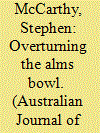

|
|
|
|
|
| Publication |
2008.
|
| Summary/Abstract |
The 2007 demonstrations in Burma posed the greatest threat to military rule there in almost twenty years. The involvement of thousands of monks across the country was of particular concern to the authorities as well as their threat of performing a religious boycott against them. This article traces the importance of Buddhism to the political legitimacy of rulers in Burma and examines how the authorities' relationship with the Sangha has undergone significant changes under military rule. It compares the 2007 demonstrations with earlier protests and examines how the regime's legitimacy has suffered as a result of yet another crackdown, significantly this time against demonstrations led by the largest institution outside of the tatmadaw.
|
|
|
|
|
|
|
|
|
|
|
|
|
|
|
|